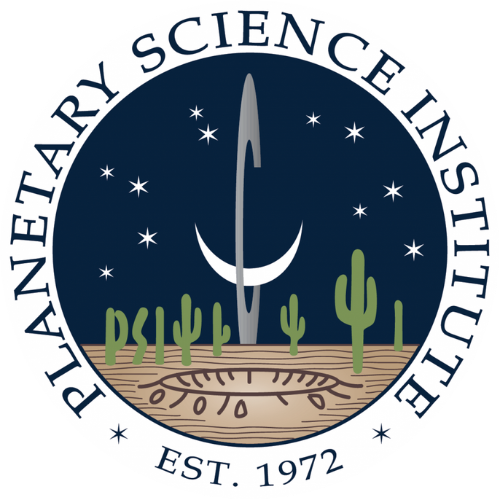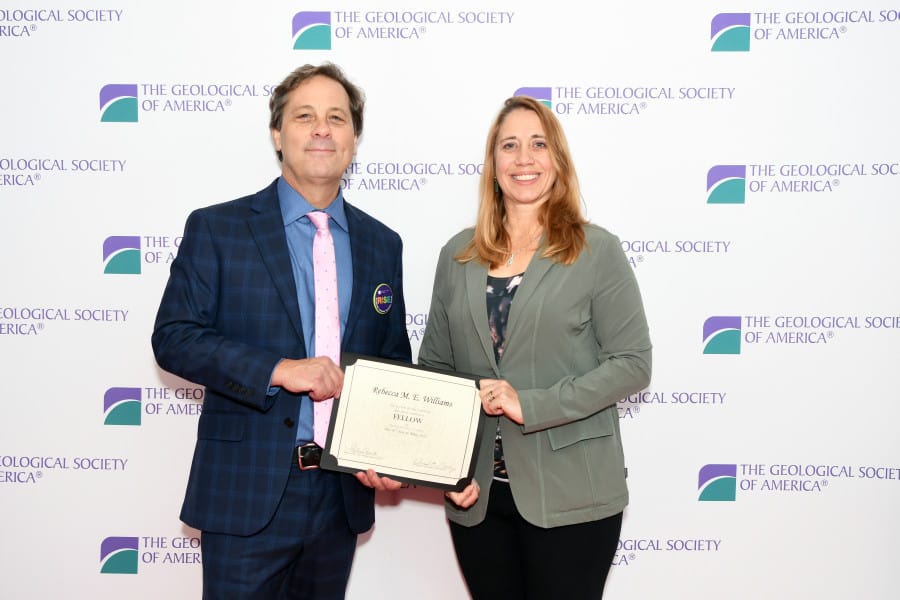November 7, 2023, Tucson, Ariz. – Planetary Science Institute Senior Scientist Rebecca M.E. Williams has been elected to be a Fellow of the Geological Society of America by the GSA Council for her work as a planetary geomorphologist who studies the signature of aqueous processes and environments as recorded in sedimentary deposits and landforms.
The citation said Williams received the award “…because of her keen ability to find interesting questions, her capacity for critical thinking, her knack for conducting field campaigns at sites on Earth that are directly applicable to Mars, and to develop coherent, robust hypotheses that stand the test of time. Becky’s field studies integrate sedimentological, topographic, and climatic datasets to investigate sediment transport, deposition, and landscape evolution. Becky has a record of publications and sustained participation in GSA meetings, including a GSA field guide for exhumed fluvial landforms in east-central Utah which is widely used in college/university field trips.”
With the objective to better understand the Martian surface water history, her research builds upon field observations of terrestrial analogs to enhance the interpretation of remotely sensed data from Mars. Williams has led fieldwork at sites in Utah, California, Australia, Patagonia, and the Atacama Desert in northern Chile to investigate river, lake and alluvial fan deposits. Currently, she participates in rover operations for two missions, and analyzes satellite images of Mars in a series of projects investigating the history of lakes, rivers and alluvial fan deposits. Williams is the Deputy Principal Investigator for the Mast Camera (Mastcam) and Mars Descent Imager (MARDI) instruments on NASA’s Mars Science Laboratory Curiosity rover, a Co-Investigator on Perseverance’s SHERLOC instrument, and a Co-Investigator on the Thermal Emission Imaging System (THEMIS) instrument on Mars Odyssey.
“I am so very honored to have been nominated by my colleagues to the Geological Society of America Fellowship. In my career, it is the conversations with geologists that are the most rewarding as we try to piece together the clues to the past, whether standing at an outcrop or remotely exploring the distant Martian landscape,” Williams said. “Through these investigations we develop a deeper understanding of the processes that formed and shaped the rocks. This is critical work to appreciate the driving forces behind changing environments and climatic conditions.”
GSA says, “Society Fellowship is an honor bestowed on the best of our profession by election at the spring GSA Council meeting. GSA members are nominated by other GSA members in recognition of a sustained record of distinguished contributions to the geosciences and the Geological Society of America through such avenues as publications, applied research, teaching, administration of geological programs, contributing to the public awareness of geology, leadership of professional organizations, and taking on editorial, bibliographic, and library responsibilities.”
Williams attended an awards ceremony on Sunday, October 15 at the annual GSA meeting held in Pittsburgh, Pennsylvania.
MEDIA CONTACT:
Alan Fischer
Public Information Officer
520-382-0411
[email protected]
SCIENCE CONTACT:
Rebecca M.E. Williams
Senior Scientist
[email protected]
PSI INFORMATION
Mark V. Sykes
Director
520-622-6300
[email protected]
PSI HOMEPAGE
http://www.psi.edu
PSI PRESS RELEASES
http://www.psi.edu/news/press-releases
THE PLANETARY SCIENCE INSTITUTE:
The Planetary Science Institute is a private, nonprofit 501(c)(3) corporation dedicated to Solar System exploration. It is headquartered in Tucson, Arizona, where it was founded in 1972. PSI scientists are involved in numerous NASA and international missions, the study of Mars and other planets, the Moon, asteroids, comets, interplanetary dust, impact physics, the origin of the Solar System, extra-solar planet formation, dynamics, the rise of life, and other areas of research. They conduct fieldwork on all continents around the world. They also are actively involved in science education and public outreach through school programs, children’s books, popular science books and art. PSI scientists are based in 30 states and the District of Columbia.

